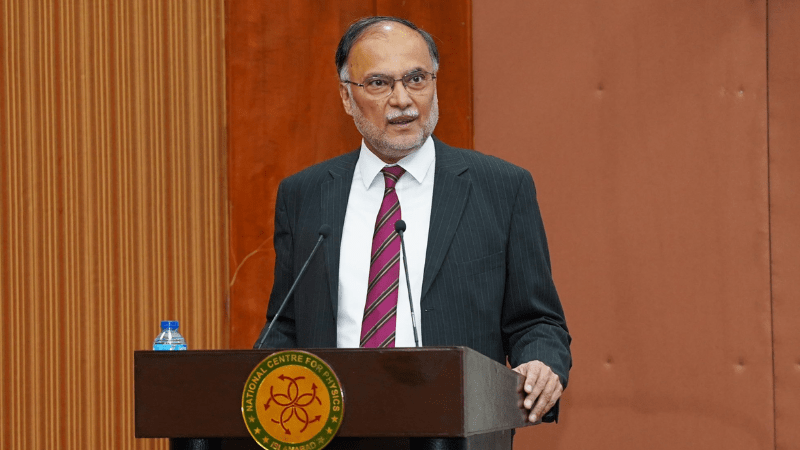Increased productivity, quality, innovation ‘instant solution’ to economic challenges: Ahsan Iqbal

ISLAMABAD, Nov 21 (APP/DNA):Minister for Planning, Development and Special Initiatives Professor Ahsan Iqbal on Thursday mentioned increased productivity, quality and innovation (PQI) as the ‘instant solution’ to the economic difficulties faced by the country in the absence of the required investment volume.
“These [PQI] are the basic pillars on which the national competitiveness of any country depends,” he said while addressing the inauguration session of the two-day National Productivity, Quality and Innovation (PQI) Summit-2024.
The summit, titled “Driving Growth Through Excellence in Productivity, Quality, and Innovation,” has been organized by the Ministry of Planning, Development and Special Initiatives, with PQI identified as key drivers for achieving sustainable economic growth and enhancing Pakistan’s global competitiveness.
Narrating success stories of developed countries that attained economic prosperity, the Planning minister said they first adopted key drivers of progress: productivity in the 1970s, quality in the 1980s and innovation in the 1990s, all triggered by the ‘knowledge explosion.’
“Competitiveness is not what you do with what you have inherited; competitiveness is all about what you are capable of creating,” Ahsan Iqbal quoted Michael E. Porter, considered the Father of Competitive Strategy.
He regretted that Pakistan was ranked 110th in the National Competitiveness Index out of 140 countries, as reported by the World Economic Forum, adding, “Unfortunately, we stand nowhere.”
The Planning minister stressed the need to improve capabilities and follow international trends and principles “if we want to be included in the leading economies of the world.”
He urged the summit participants to explore ways for all sectors including public, private, industry, agriculture and services to move forward in line with the principles of enhanced PQI.
“The key to tackling the economic challenges is export-led economic growth, which can open the door to success for Pakistan by increasing exports from the current $30 billion to $100 billion,” he remarked.
Ahsan Iqbal informed the audience that friendly countries, especially Gulf States including Saudi Arabia, United Arab Emirates, Kuwait and Qatar had an overall investment portfolio of $29 billion in diverse fields in Pakistan.
He said Pakistan was turning around due to the difficult decisions taken by the current government of Pakistan Muslim League-Nawaz (PML-N), at the cost of its ‘political capital.’
He mentioned the decrease in inflation, increased economic growth, a record-breaking surge in the Pakistan Stock Exchange, international recognition by rating agencies and the initiation of CPEC Phase-2.
“Opportunities are knocking at the door, and now Pakistan cannot afford any political uncertainty and instability, which have hindered progress and prosperity in the past,” he cautioned.
The Planning minister expressed the desire to fulfill the dream of the Founders of Pakistan Quaid-e-Azam Muhammad Ali Jinnah and Allama Muhammad Iqbal to make the country a developed and prosperous state by 2047, when it would mark 100 years of independence.
The two-day summit gathered renowned scholars from academia and industry, CEOs of leading brands, leaders from chambers of commerce and industry, and corporate leaders from across the country.
The participants engaged in comprehensive discussions and collaborative efforts to enhance productivity, elevate quality standards, and foster innovation in various sectors of the economy.
During the summit, breakout sessions were held on Productivity, Quality, and Innovation, attended by research scholars, think tanks, academia, and industry representatives.
These sessions focused on improving productivity for sustainable growth, raising quality standards to meet international benchmarks, and promoting innovation to build a competitive economy.
The summit is set to serve as a milestone in achieving the goal of increasing exports, ensuring economic stability, and ultimately maintaining Pakistan as a trillion-dollar economy by 2035 and a three-trillion-dollar economy by 2047, under the Ministry’s development framework based on the 5Es: Exports, Energy, E-Pakistan, Environment and Climate Change, Food Security, and Equity.
The framework emphasizes providing equal opportunities for all, with a special focus on empowering youth, women, and minorities, as well as developing the less developed areas of the country.
Related News

Dar, Abdelatty urge immediate ceasefire in Gaza at conference
ISLAMABAD, JUL 28 /DNA/ – Deputy Prime Minister/Foreign Minister of Pakistan, Senator Mohammad Ishaq DarRead More

Germany’s Karachi consulate suspends services for non-EU nationals
KARACHI, JUL 28: The Consulate General of the Federal Republic of Germany in Karachi hasRead More


Comments are Closed